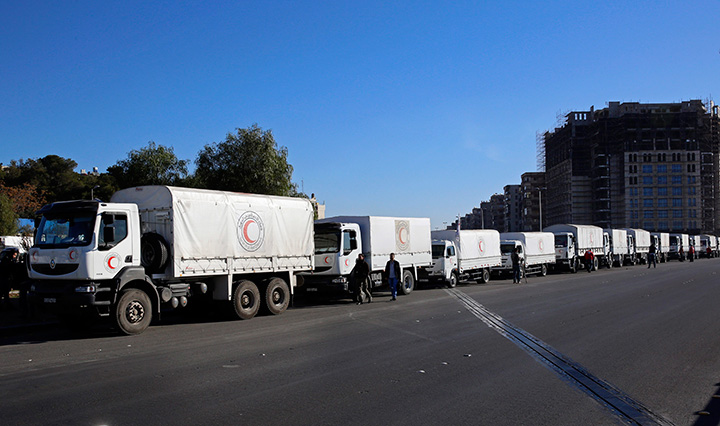DAMASCUS, Syria – German Chancellor Angela Merkel on Wednesday renewed her proposal for a no-fly zone in Syria where civilians would be protected, a suggestion that was promptly rebuffed by Moscow that said it can only be done with the Syrian government’s consent.

In Damascus, over 100 trucks loaded with humanitarian aid that were expected to be delivered to five besieged areas in the country arrived as part of an effort described by a Russian official as a first step toward implementation of an agreement reached among world powers in Munich last week.
U.N. envoy Staffan de Mistura has been trying to secure aid deliveries to improve the chances of restarting peace talks before the end of February. But those efforts have been clouded by the intense fighting north of Aleppo, where various forces backed by regional and international rivals are clashing over a crucial strip of land linking Syria’s largest city to the border with Turkey.
The violence in Aleppo and lack of improvement on the humanitarian front led to the collapse of indirect talks between the Syrian government and its opponents in Geneva earlier this month.
READ MORE: ‘Put up or shut up’ on Syrian ceasefire
It appears also to have revived a long-standing proposal to establish a no-fly zone in northern Syria – an idea that has been repeatedly floated by Turkey and other opponents of Syrian President Bashar Assad throughout the five-year-old war.
A no-fly zone would potentially create a safe haven for tens of thousands of displaced Syrians. But Washington has long rejected the idea, fearing it would draw U.S. forces further into the civil war.
Merkel expressed support for the idea on Tuesday, and repeated it again on Wednesday at parliament. She said it could be done by agreement between Assad, his backers and the coalition fighting the Islamic State group.
At a news conference, she said such an agreement would be “a sign of good will” and would put many people at ease.
She appeared to be referring to a more informal agreement to stop aerial attacks within the suggestion that this could help bring about the overall cessation of hostilities agreed upon in Munich.
READ MORE: Russia denies its warplanes hit Syria hospital
“It would be helpful if there were an area in Syria that none of the parties to the war bombed,” she said.
Enforcing a no-fly zone has become considerably more difficult since Russia began its air campaign in Syria late last year. A senior Russian diplomat, Deputy Foreign Minister Gennady Gatilov, shrugged off Merkel’s proposal, saying it would require Damascus’ consent and Security Council approval.
Turkish President Recep Tayyip Erdogan criticized the United States for not backing his country’s proposals, adding that a no-fly would have prevented Russia’s air campaign in the region and thwarted thousands of civilian deaths.
“Oh America! You did not say ‘yes’ to ‘no-fly zone.’ Now the Russian planes are running wild over there, and thousands and tens of thousands of victims are dying,” Erdogan said. “Weren’t we coalition forces? Weren’t we to act together?”
READ MORE: ISIS faces budget crunch, slashing salaries, perks
The U.S., Russia and other world powers agreed last week on ceasing hostilities within a week, the delivery of urgently needed aid to besieged areas of Syria and a call to return to peace talks in Geneva.
Gatilov said that “the implementation of the Munich agreements on Syrian settlement has started.”
He said a working group on humanitarian access to the besieged areas has met and is set to again meet Thursday. He said it will discuss practical issues related to the aid delivery.
In Damascus on Tuesday, de Mistura suggested that humanitarian aid would be allowed into several besieged areas Wednesday, calling it the “duty of the government of Syria.”
“Tomorrow we test this,” he said after meeting with Syria’s foreign minister. The U.N. later said the Syrian government has approved access to seven such areas across the country and that convoys would head out in the coming days.
The Syrian foreign ministry hit back Wednesday, saying “we do not wait for anyone to remind us of our duties toward our people.”
“In fact, the Syrian government is the one that needs to test the credibility of the U.N. envoy,” a statement said.
The operation proceeded nonetheless, with over a 100 trucks heading to besieged areas Wednesday. After an hours-long delay, the convoys carrying food, medicine and other assistance reached the rebel-held town of Madaya, northwest of the capital, while a 35-truck convoy was to deliver aid to the rebel-held suburb of Moadamiyeh southwest of the capital.
A mobile clinic offered by the Syrian Red Crescent also entered Madaya to tend to wounded civilians.
According to the agreement, aid would simultaneously be delivered to two communities in the northern Idlib province that are besieged by rebels.
The convoys represent the third humanitarian aid delivery to the besieged communities after two similar efforts last month.
The U.N. estimates that 18 Syrian communities are besieged, affecting around half a million people.
—
Associated Press writers Vladimir Isachenkov in Moscow, Zeina Karam in Beirut and David Rising in Berlin contributed to this report.



Comments